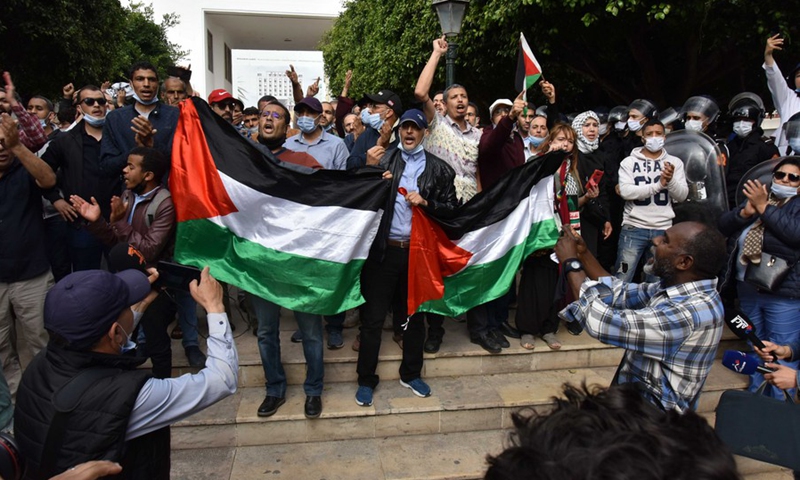
Moroccan protesters wave Palestine flags and shout anti-Israeli slogans during a rally in Rabat, Morocco, on May 10, 2021.(Photo: Xinhua)
Moroccans head to the ballot box on Wednesday for parliamentary and local elections that will decide the fate of Islamists who have governed the kingdom.
Doors will open at polling stations at 8:00 am and close at 7:00 pm for the 18 million on the electoral roll, who will vote for 395 MPs and more than 31,000 local and regional officials.
King Mohammed VI will name a prime minister from the party that leads the parliamentary poll to govern for the next five years.
The palace remains the source of key decisions and strategic direction in the country of 36 million people.
Swept to power in the wake of the 2011 uprisings around the Middle East and North Africa, the Islamist Justice and Development Party (PJD) hopes to secure a third term leading a ruling coalition.
Compared with demands back then for an end to "corruption and despotism,"2021's two-week election campaign has been mostly stable, with no large gatherings due to the coronavirus.
In the final days, however, PJD and its close rival the National Rally of Independents (RNI) have exchanged heftier blows.
Former prime minister and PJD leader Abdelilah Benkirane attacked the RNI boss, billionaire businessman and Agriculture Minister Aziz Akhannouch, in a fiery Facebook video on Sunday.
"The head of government must be a political personality with integrity who is above suspicion," he said.
Akhannouch, who is said to be close to the royal palace, retorted in an interview on Monday that the attacks were "an admission of failure" by his opponents, vowing not to respond.
Following the last elections in 2016, the RNI leader secured critical ministerial jobs for his party, including the economy and finance and industry portfolios. Besides the PJD and RNI, the liberal Authenticity and Modernity Party (PAM), formed by an influential royal adviser, and the center-right Istiqlal Party are both seen as front-runners in local media.
The election campaign has been marked by PAM's allegations that RNI was buying votes - denied by Akhannouch's party - while PJD blasted excessive political spending without giving names.
Changes to the voting system in 2021 mean parties' shares of seats will be calculated based on registered voters, rather than those who actually cast their ballots, in an amendment seen as favoring smaller parties.
On the same vote share as in 2016, the new system could leave the PJD with around 80 seats, rather than the 125 it scored last time, making post-election coalition-building trickier. All parties are expected to sign up, regardless of who wins the election.




